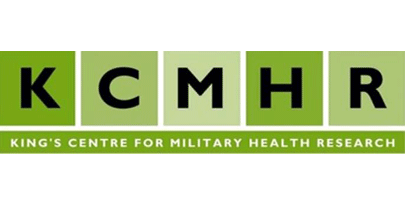New KCMHR PhD Study Aims to Explore Self-Harm and Suicide Behaviours Among UK Armed Forces Personnel and Veterans
Content Warning: self-harm and suicide behaviours
Suicide is a major cause of death globally. The World Health Organisation have reported that over 700,000 people die by suicide every year worldwide, equivalent to one person every 40 seconds. Military service places substantial demands on personnel which can affect their health and wellbeing both during and after service, yet it remains unclear whether military service increases the risk of suicide behaviours.
Death by suicide appears to be rare in the UK Armed Forces, but even one preventable death is one too many. A similar trend has been found for self-harm where the prevalence of deliberate self-harm among the UK Armed Forces appears to be low, although it has increased in recent years. There remains little research exploring self-harm and suicide behaviours specifically among the UK Armed Forces which this new PhD study aims to address.
Who is conducting the research?
Charlotte Williamson, a first year PhD candidate at the King’s Centre for Military Health Research (KCMHR) at King’s College London, is conducting a study supervised Dr Sharon Stevelink and Dr Marie-Louise Sharp, and funded by the Office for Veterans’ Affairs, which will explore the prevalence of, and risk and protective factors associated with, self-harm, suicidal ideation and suicide attempts among the UK Armed Forces.
After completing an undergraduate degree in Psychology and a master’s degree Mental Health, Ethics and Law, Charlotte worked as a Research Assistant in the field of military mental health for just over two years prior to starting this PhD. Her research interests include self-harm and suicidality, military mental health and using digital technology in mental healthcare.
What do we already know?
Deaths by suicide in the UK Armed Forces were previously lower than the UK general population. However, in the last five years Army male suicides have increased, and since 2017 they have matched the suicide prevalence in the general population for the first time since the mid-1990s, making it a cause for concern. Between 2001 and 2020 there were 284 confirmed deaths by suicide in the UK Armed Forces. Some identified risk factors for death by suicide include but are not limited to being male, younger age, experience of childhood adversities (i.e. highly stressful events or situations that occur during childhood or adolescence, such as physical abuse, exposure to domestic violence and parental substance misuse), service in the Army and history of self-harm.
Opportunities could be improved for intervention and prevention
Similarly, the rates of deliberate self-harm appear to be low in this population, but they have also increased in recent years from 2.2 per 1,000 in 2010/2011 to 3.1 per 1,000 in 2017/2018. A UK study reported that the prevalence of self-harm in a sample of UK Armed Forces personnel and veterans had almost doubled between 2003 and 2016; 1.8% to 4.2% in serving personnel, and 3.8% to 6.6% in veterans. Some identified risk factors for self-harm include being female, younger age, being an early service leaver (i.e. left the military with less than four years of service) and poor social support.
What will Charlotte’s PhD focus on?
Over the next three years, the PhD study aims to provide an overview of self-harm and suicide behaviours in the UK Armed Forces, including exploring the prevalence of, and identifying the risk and protective factors associated with, self-harm, suicidal ideation, and suicide attempts. The PhD study will apply both qualitative and quantitative methods (in-depth interviews and statistical analyses), and participants will include UK military service personnel and ex-service personnel (veterans, i.e. those who have left military service) who have participated in the KCMHR Health and Wellbeing Study. Since 2003, KCMHR have followed up the long-term health and wellbeing of those who served during the Iraq and Afghanistan deployments. Data has been collected over three prior phases, with the fourth wave of data being collected at present.
Why is it important?
Identifying the risk and protective factors associated with self-harm and suicide behaviours among service personnel and veterans will help to provide robust evidence to government and wider stakeholders. It will also inform the development and implementation of effective prevention and intervention methods to protect the mental health and wellbeing of the UK Armed Forces. This research has potential clinical, occupational and lifestyle implications and could be a part of improving military and veteran mental health services in the UK.
Want to know more?
For updates on this study and other work being conducted at KCMHR please follow @CF_Williamson and @kcmhr on Twitter and take a look at the most recent blog posts.
Funding
This PhD study is funded by the Office for Veterans’ Affairs, Cabinet Office, UK Government, but is conducted by KCMHR which is a fully independent research group.
Need to access help and support?
For immediate crisis help
NHS 111 Online
Speak to health professionals for advice about mental and physical health. Open 24 hours a day, 365 days a year.
Tel: 111 Web: https://111.nhs.uk/
Samaritans
Someone to talk to 24 hours a day. Open 24 hours a day, 365 days a year.
Tel: 116 123 Email: [email protected] Web: www.samaritans.org
Combat Stress 24 Hour Helpline
Provides confidential help and advice on any mental health issues to the military community and their families. Open 24 hours a day, 365 days a year.
Helpline: 0800 138 1619 Email: [email protected] Text: 07537 404719 (standard charges may apply)
Please see our signposting booklet detailing national and local support for the Armed Forces community https://kcmhr.org/pdf/2021-p4-support.pdf
